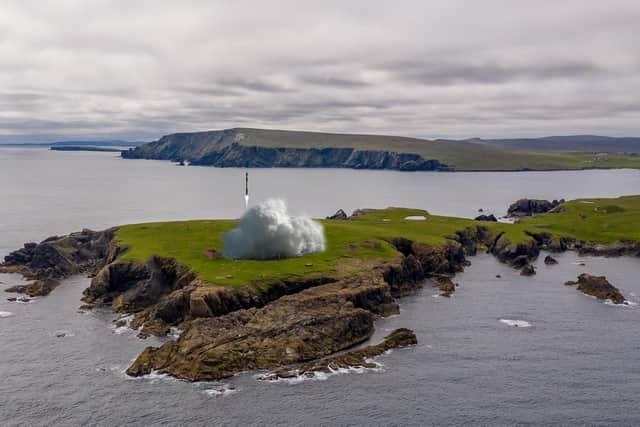Space race enters new phase with Shetland poised to take the lead – Anthony Browne
Perhaps they think of Cape Canaveral in Florida or the Houston control room. Rockets have been launched into space from other countries, including South Korea, India, and Japan. The UK launched its first orbital rocket from Australia, and the European Space Agency human spaceflight programme (which the UK is involved in) launches its rockets from French Guiana, in South America. No rocket has ever been launched into orbit from Europe.
The space race is entering the next phase – one that the UK, and the Shetland Islands in particular, are poised to take a lead on. As technology advances, the commercial opportunities of space are growing rapidly – unnoticed, almost everyone uses space services, on a routine basis. From watching TV to making international phone or video calls, to simply using the internet – much of it is routed via satellites. From life science experiments to mapping, the commercial uses for satellites are expanding rapidly.


Advertisement
Hide AdAdvertisement
Hide AdIncreasingly, the focus of the space industry is less on giant rockets capable of launching people and shuttles, or getting to Mars, and more on smaller rockets that can safely get satellites into orbit. And that is where the Shetland Islands come in – their geography means they are a perfect launch site for the new generation of smaller, satellite-bearing rockets. They can launch over the northern part of the North Atlantic, where there is no land and few boats, and lightly used airspace, and enter into polar orbit. If you launch from Shetland in the direction of the North Pole, the first land you would pass over would be New Zealand.
Last week we gave consent for the Civil Aviation Authority to grant a spaceport licence, announced day, for SaxaVord Spaceport on the Lamba Ness peninsular on Unst, the most northern island in the Shetlands – and the most northern point of land in the United Kingdom. The CAA undertook all the safety and environmental checks, and the licence will allow SaxaVord to host up to 30 vertical rocket launches a year, with rockets up to 30 metres long taking pay loads of up to 1.5 tonnes into a wide range of orbits. Construction of the spaceport is well underway, protected by a sign that warns: “Any Aliens will be reported to the Space Police and deported to Mars.”
Launches will be able to take place next year. It is expected that in 2024, SaxaVord will create 605 mainly highly skilled jobs in Scotland, including 210 in Shetland. Shetland’s long history of supplying and servicing the oil and gas industry, with its complex engineering needs, show that it is up to the task.
The growth of the space industry means that demand for launch pads is outstripping the supply. You can’t just set up a spaceport anywhere – it needs to be far from communities, to be able to launch over the sea (for the public’s safety and for first stages to splash down into), and have a path to orbit through clear air space so it does not interfere with aviation. Apart from maybe the artic coast of Norway, there are no other places in Europe that have these features. You also need a regulatory regime that enables space licences to be issued – the UK Parliament has already specifically legislated for that.
The strong demand for launch services means that SaxaVord is already signing a range of commercial contracts with space companies that want to use it, including a joint venture between Lockheed Martin and ABL Space Systems. In January this year, SaxaVord announced a partnership with Rocket Factory Augsburg, giving the German company exclusive access to the Fredo launchpad for orbital launches planned for 2024.
Having Europe’s only vertical launch spaceport will give a huge boost to the UK’s already vibrant space industry. We have over 1500 companies involved in space-related activities, employing nearly 50,000 people, with revenues of £17.5bn in 2020/21. The companies do everything from design and make the satellites themselves, to the technology inside them, and all the support operations. Our satellite companies will now be able to offer a direct and local end to end route to launch – a huge commercial advantage. Being able to launch from Europe is obviously a lot cheaper and more convenient for all European space companies - they do not have to transport their rockets to other continents.
When it comes to this next phase of the space race, the sky is not the limit – our opportunities go far beyond.
Anthony Browne is Parliamentary Under Secretary of State in the Department for Transport
Comments
Want to join the conversation? Please or to comment on this article.